

Ontario Ministry of Education - Teacher Education. The Provincial & Demonstration Schools offer a variety of workshops and courses that address the needs of students with learning disabilities.
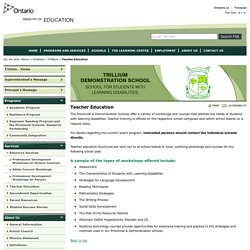
Teacher training is offered on the respective school campuses and within school boards on a request basis. For details regarding the current year's program, interested persons should contact the individual schools directly. Teacher education brochures are sent out to all school boards in June, outlining workshops and courses for the following school year. Assessment The Characteristics of Students with Learning Disabilities Strategies for Language Development Reading Techniques Mathematics Strategies The Writing Process Social Skills Development The Role of the Resource Teacher Attention Deficit Hyperactivity Disorder and LD Assistive technology courses provide opportunities for extensive training and practice in the strategies and methods used in our Provincial & Demonstration schools.
Back to top. Ontario Ministry of Education - Trillium Demonstration School. Ontario Ministry of Education - Links for Teachers. Teacher Education - Summary Report. Teaching Assistant Training. Children's Mental Health Ontario - Resources for Professionals. This section will be of interest to professionals who work with children and youth in a variety of settings - for example - early childhood education, residential treatment, youth justice, child welfare, and child and youth mental health.

School Health Information for Professionals. ESL/ELD Resource Group of Ontario. Learning Disabilities Association of Ontario. Ontario Association for Developmental Education. Ontario Council for Exceptional Children. Teachers of English as a Second Language Association of Ontario. The Identification, Placement, and Review Committee. Exceptional pupils are identified as such by an Identification, Placement, and Review Committee (IPRC).
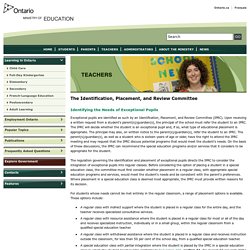
Upon receiving a written request from a student's parent(s)/guardian(s), the principal of the school must refer the student to an IPRC. The IPRC will decide whether the student is an exceptional pupil and, if so, what type of educational placement is appropriate. The principal may also, on written notice to the parent(s)/guardian(s), refer the student to an IPRC. The parent(s)/guardian(s), as well as a student who is sixteen years of age or older, have the right to attend the IPRC meeting and may request that the IPRC discuss potential programs that would meet the student's needs.
On the basis of these discussions, the IPRC can recommend the special education programs and/or services that it considers to be appropriate for the student. For students whose needs cannot be met entirely in the regular classroom, a range of placement options is available. Identification, Placement and Review Committee Process. Indentification, Placement & Review Committee - Parent Guide. Individual Education Plans. Standards for Development, Program Planning, and Implementation 2000 This publication is also available as an Adobe Acrobat file (PDF, 92 KB).
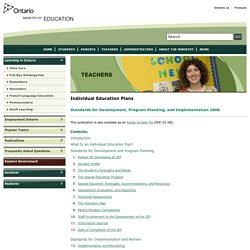
Contents: Introduction What Is an Individual Education Plan? Standards for Development and Program Planning Standards for Implementation and Review This document describes new, province-wide standards that school boards(1) must meet when developing, implementing, and monitoring Individual Education Plans (IEPs) for exceptional students, in accordance with Regulation 181/98 of the Education Act, and for students not identified as exceptional who are receiving a special education program and services.
The 2000–2001 school year will be a year of transition, as boards move from developing IEPs without reference to common standards to compliance with the provincial standards set out in this document. The Individual Education Plan Process. See also: When an Identification, Placement, and Review Committee (IPRC) identifies a student as an exceptional pupil, the principal must ensure that an Individual Education Plan (IEP) for that student is developed and maintained.
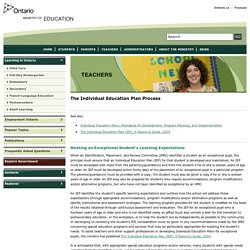
An IEP must be developed with input from the parent(s)/guardian(s) and from the student if he or she is sixteen years of age or older. An IEP must be developed within thirty days of the placement of an exceptional pupil in a particular program. The parents/guardian(s) must be provided with a copy; the student must also be given a copy if he or she is sixteen years of age or older. An IEP may also be prepared for students who require accommodations, program modifications and/or alternative programs, but who have not been identified as exceptional by an IPRC.
Individual Education Plan (IEP) - Parent Guide. Individual Education Plan Parent Guide Your Child's Individual Education Plan: A Guide for Parents can be accessed at HERE.
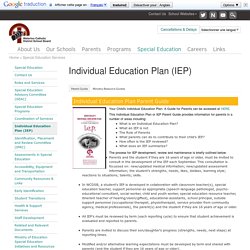
This Individual Education Plan or IEP Parent Guide provides information for parents in a number of areas including: What is an Individual Education Plan? What an IEP is not The Role of Parents What parents can do to contribute to their child's IEP? How often is the IEP reviewed?